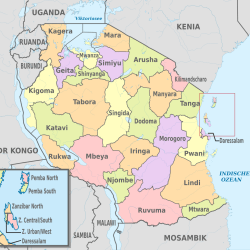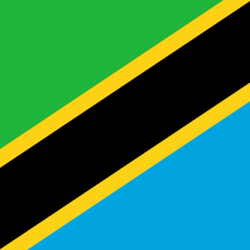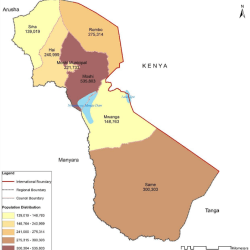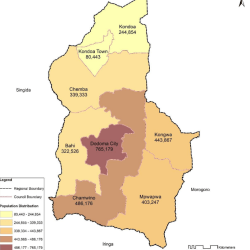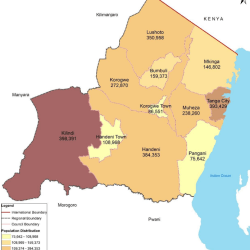The United Republic of Tanzania is located in Eastern Africa between longitude 29o and 41o East, Latitude 1o and 12o South.

The United Republic of Tanzania was formed out of the union of two sovereign states namely Tanganyika and Zanzibar.

Tanganyika became a sovereign state on 9th December, 1961 and became a Republic the following year. Zanzibar became independent on 10th December, 1963 and the People’s Republic of Zanzibar was established after the revolution of 12th January, 1964. The two sovereign republics formed the United Republic of Tanzania on 26th April, 1964. However, the Government of the United Republic of Tanzania is a unitary republic consisting of the Union Government and the Zanzibar Revolutionary Government.

Tanzania is the biggest (land area) among the East African countries (i.e. Kenya, Uganda and Tanzania). Tanzania has a spectacular landscape of mainly three physiographic regions namely the Islands and the coastal plains to the east; the inland saucer-shaped plateau; and the highlands.

The Great Rift Valley that runs from north east of Africa through central Tanzania is another landmark that adds to the scenic view of the country.
The country has the largest concentration of wild animals. It also has pristine sandy beaches and Africa’s highest and snow-capped mountain, Mt. Kilimanjaro.
Tanzania is home to the world famous National Parks and Game Reserves of: Ngorongoro Crater, Selous Game Reserve, Gombe Stream, Tarangire, Lake Manyara, Mikumi, Arusha, Ruaha, Saadani, Udzungwa Mountains, and Mkomazi Game Reserve. Other Game Reserves include: Amani, Kigosi, Lukwika-Lumesule, Maswa, Monduli Mountains, Msangesi and Ugala.

Dar es Salaam is the commercial capital and major sea port for Tanzania Mainland and it serves neighbouring land-locked countries of Malawi, Zambia, Burundi, Rwanda, and Uganda, as well as Eastern DRC. Other sea ports include Zanzibar, Tanga, and Mtwara. Because of its geographical and locational advantage, Dar es Salaam Port presents itself as the gateway into East and Central Africa. Furthermore, this renders Tanzania as a logical investment destination for investors.

Year 2005 General Elections: Since attaining political independence in 1961, Tanzania has held without fail Presidential and Parliamentary Elections (general elections) after every 5 year period. Following results from the Presidential and Parliamentary Elections held on 14th December, 2005, the 4th President of Tanzania, H.E. Jakaya Mrisho Kikwete was sworn into office on 21st December, 2005 for a five-year term of office. Since 1985, Tanzania has followed a two term limit for the Presidency. President Kikwete’s campaign slogan was “New Vigour, New Zeal, and New Speed: Promoting Better Life for all Tanzanians”. The majority of Tanzanians have been inspired by this and have rallied strongly behind the President.
The country enjoys political stability and all former Presidents, Vice Presidents, and Prime Ministers live in Tanzania and are accorded respect. On 25th June, 2006 President Jakaya Mrisho Kikwete was elected Chairman of the ruling political party (CCM) by its General Congress.

Economic Policy Stance: The Government of Tanzania under the leadership of HE President Jakaya Mrisho Kikwete (popularly referred to as JK) is committed to the pursuit of sound, consistent and predictable macro-economic policies with low inflation. The policy stance is one of building on the foundations and successes of the 3rd Phase Government (November 1995 – December 2005) and scaling-up implementation and policy targeting more effectively and efficiently with “New Vigour, New Zeal, and New Speed”. Promotion of good governance, adherence to the rule of law, promotion of private sector development and opening-up new areas with high economic potential are some of the key issues of the 4th Phase Government. Expansion of investments, job creation, export expansion, value addition chains and scaling-up on human capital development are consequent and complementary actions within the policy stance.
One of the key areas of policy focus is promotion of sustained and shared economic growth. The 4th Phase Government is committed to pursuing pro-investment and pro-growth policies. Moreover, the Government is committed to promotion of public-private sector partnership and in this regard, the public and private sectors meet under the umbrella of the Tanzania National Business Council (TNBC), a forum of policy dialogue and consultation between the public and private sectors. Academia, research institutions, NGOs, CSOs and others, are also engaged in dialogue via a number of other forums such as the Public Expenditure Review (PER) designed to promote wider participation in policy discussions. Tanzania has a vibrant national consultative process that cements national unity and social cohesiveness, which ultimately contribute to promoting peace, security and stability, attributes that are important for a conducive investment climate. With such attributes, coupled with its vast natural resurces base, geographical and locational advantage, a large domestic market and a labour force, Tanzania is an ideal investment destination. We welcome FDIs, we welcome tourists and we also welcome joint ventures and public-private partnerships.
Reference: www.tanzania.go.tz/profilef.html
